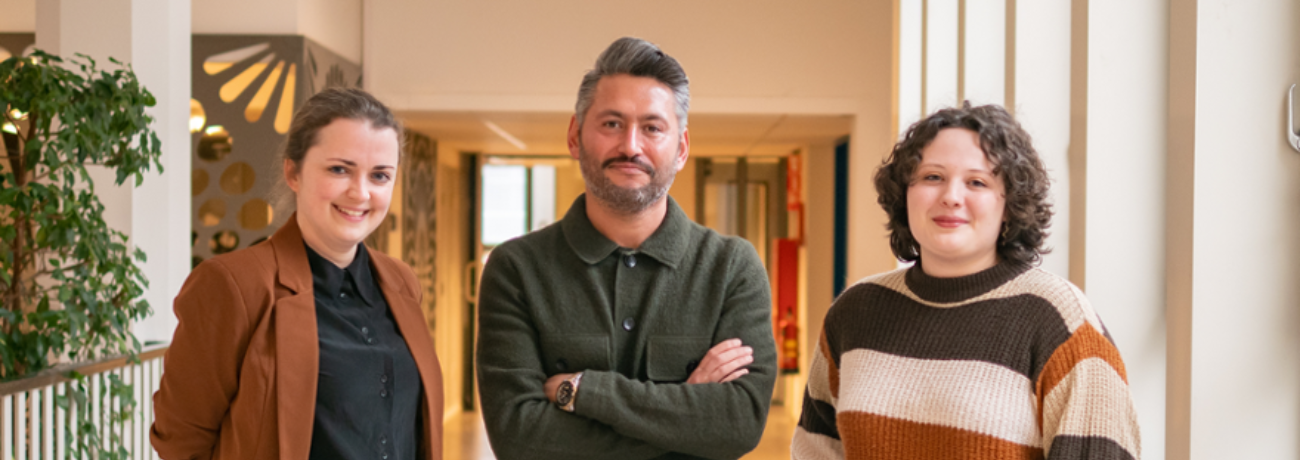Interdisciplinary minor ‘Violence Studies’: ‘It felt like we were going to fight a group of people’
The interdisciplinary, English-taught minor ‘Violence Studies’ looks at violence from very diverse scientific perspectives. What are the benefits of this approach? Students and lecturers evaluate: ‘This minor’s a goldmine’.
We think we know violence because it is so often present in our society. We know the many faces of violence, from riots to bar fights. But violence is actually a complex concept: how it originates, how it can be avoided and how we can treat offenders and victims is being studied by researchers in various fields. That’s why the interdisciplinary, English-taught minor ‘Violence Studies’ treats the subject from an interdisciplinary point of view: law, governance, archaeology, psychology, education and child studies, and biology. Through field trips, students meet offenders, victims and enforcers. The first edition of ‘Violence Studies’ was held from September 2022 to January 2023. Both students and lecturers are very enthusiastic about its interdisciplinary setup.

Annemarie Sommer, International Studies student:
‘This minor broadens your horizon’
‘In my major, we talk a lot about violence, but more in general terms of how to deal with state violence or violence within a country. In this minor, we talked about what actually happens in the human brain and also about processes concerning collective violence, models about police forces and discrimination. I had never heard of all these things, despite writing several papers on similar topics.
‘The interdisciplinarity of the minor was really useful. Not only did I learn about Dutch legal aspects that were new to me, but there was also this wonderful archaeology lecture by David Fontijn dealing with the Bronze Age, swords and identity. There's this general idea that the past was so violent, but Prof. Fontijn showed that the past is as varied as anything you’d think of. There were violent times, but there were also peaceful times. This idea that the past was violent and we’ve become civilised, law has developed and now everything’s fine, is debatable.
‘This minor showed me that violence should be talked about with more balance and nuance. Policymakers, for instance, should be very careful to look at political theories and apply them to such a highly diverse concept as violence. And I’m thinking about pursuing a career as a policymaker myself. I would definitely recommend this minor to other students; it broadens your horizon. Even if the things you learn in this minor are not directly applicable to your own field, you just know so much more.’

Jolien van Breen (assistant professor at the Faculty of Governance and Global Affairs) focuses on inter-group conflict and violence:
‘You start to understand that interdisciplinarity is a skill’
‘When you’re talking about a topic such as violence, you need to study it from multiple perspectives to really get a grasp on what it means. That’s what this minor does. But also, you start to understand that interdisciplinarity is a skill. We’re not just offering different perspectives on one topic. We’re teaching students how to approach and work with a problem from many different perspectives and angles.
‘I think the biggest benefit for me teaching this interdisciplinary course was being able to engage with students from various backgrounds. When you’re working with students, you have to think about your material in a different way. And that’s especially true of an interdisciplinary minor when you’re getting all kinds of students who have varied questions. Also, as a researcher it helps you to build a network with lots of people that you want to connect with. It’s often nice to be able to ask someone to give a guest lecture in your own course, as a first point of contact. Teaching an interdisciplinary minor is also a network-building exercise. The minor is also a goldmine for research ideas. The study of violence is still a body of disjointed perspectives. There is so much space still to integrate everything. For example, for the next edition of the minor, I would love to have a public health researcher give a lecture.’
Amy Stet, third-year Pedagogical Sciences student:
‘It really felt like we were going to fight a group of people’
‘I learned a lot from the minor and really appreciated the diversity of the courses. We learned about victims and offenders, about perspectives from both sides. Also, there were some really good field trips, like the one to the Dutch riot police. We gained some unique, vivid insights into group violence. It really felt like we were going to fight a group of people! And in the course ‘Violence and the Brain’ we got to visit the Pieter Baan Centrum. Being able to talk to people who work there was impressive.
‘I would recommend the minor because it offers a lot of insights into ways that violence is exercised. Violence has all sorts of facets and the minor gives you a great overview, due to its interdisciplinary setup. I’m thinking of pursuing a career in the forensic side of child abuse; the knowledge I gained in this minor could prove very useful.’

Moji Aghajani (assistant professor at the Faculty of Social and Behavioural Sciences) focuses on violent behaviour and the brain:
‘Having interdisciplinary collaborations that are so diverse background-wise is new to me’
‘Most of my direct colleagues obviously have similar backgrounds as behavioural scientists, or in psychiatry or perhaps even psychobiology or neuroscience. But in this minor, I have colleagues from The Hague faculty who do totally different research. It’s really nice to meet with them and brainstorm on ideas, the lecture content and everything around it. It’s really new to me to have interdisciplinary collaborations that are so diverse background-wise. And I do believe that if this programme continues for a couple more years, we will be moving towards a direction of actually acquiring funding together and doing really good research together as well.
‘For the next edition of the minor, it would be great if students from the Faculty of Medicine would attend, as violence plays a big role in their field as well. And students from exact sciences, like computer sciences, could, for instance, give their input on how we could build algorithms to protect against violence.’
Text: Jan Joost Aten
Photos: Simone Both
Experience the minor yourself!
Are you a student and interested in taking part in the minor in 2023? Read all about it here.
Are you a lecturer and would you like to know more about participating in this interdisciplinary minor? Please send an e-mail to violence@fgga.leidenuniv.nl.
Social Resilience and Security interdisciplinary research programme
The ‘Violence Studies’minor is an initiative by the Leiden University ‘Social Resilience and Security’ interdisciplinary research programme. Researchers from various scientific disciplines are collaborating to investigate how people can become more mentally and socially resilient to phenomena in modern society, including suicide, violence and uncertainty.

